
Animal Farm is a satirical allegorical novella, in the form of a beast fable, by George Orwell, first published in England on 17 August 1945. It tells the story of a group of anthropomorphic farm animals who rebel against their human farmer, hoping to create a society where the animals can be equal, free, and happy. Ultimately, the rebellion is betrayed, and under the dictatorship of a pig named Napoleon, the farm ends up in a state as bad as it was before.

Eric Arthur Blair was an English novelist, poet, essayist, journalist, and critic who wrote under the pen name of George Orwell. His work is characterised by lucid prose, social criticism, opposition to totalitarianism, and support of democratic socialism.

A. J. Raffles is a British fictional character – a cricketer and gentleman thief – created by E. W. Hornung. Between 1898 and 1909, Hornung wrote a series of 26 short stories, two plays, and a novel about Raffles and his fictional chronicler, Harry "Bunny" Manders.
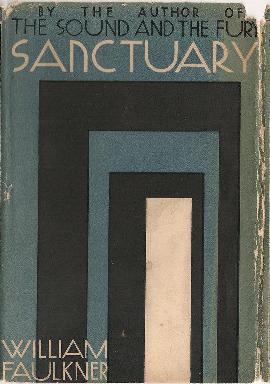
Sanctuary is a 1931 novel by American author William Faulkner about the rape and abduction of an upper-class Mississippi college girl, Temple Drake, during the Prohibition era. The novel was Faulkner's commercial and critical breakthrough and established his literary reputation, but was controversial given its themes. It is said Faulkner claimed it was a "potboiler", written purely for profit, but this has been debated by scholars and Faulkner's own friends.

Ernest William Hornung was an English author and poet known for writing the A. J. Raffles series of stories about a gentleman thief in late 19th-century London. Hornung was educated at Uppingham School; as a result of poor health he left the school in December 1883 to travel to Sydney, where he stayed for two years. He drew on his Australian experiences as a background when he began writing, initially short stories and later novels.
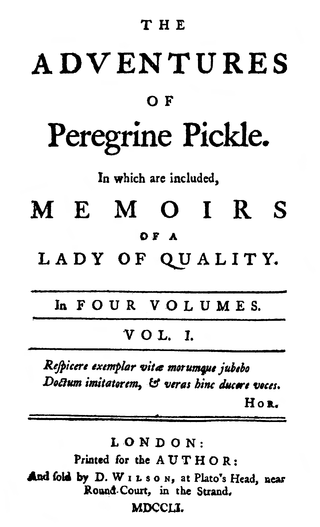
The Adventures of Peregrine Pickle is a picaresque novel by the Scottish author Tobias Smollett, first published in 1751 and revised and published again in 1758. It tells the story of an egotistical man who experiences luck and misfortunes in the height of 18th-century European society.
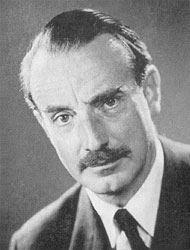
James Hadley Chase was an English writer. While his birth name was René Lodge Brabazon Raymond, he was well known by his various pseudonyms, including James Hadley Chase, James L. Docherty, Raymond Marshall, R. Raymond, and Ambrose Grant. He was one of the best known thriller writers of all time. The canon of Chase, comprising 90 titles, earned him a reputation as the king of thriller writers in Europe. He was also one of the internationally best-selling authors, and to date 50 of his books have been made into films.
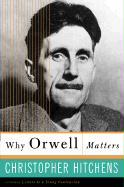
Why Orwell Matters, released in the UK as Orwell's Victory, is a book-length biographical essay by Christopher Hitchens. In it, the author relates George Orwell's thoughts on and actions in relation to: The British Empire, the Left, the Right, the United States of America, English conventions, feminism, and his controversial list for the British Foreign Office.

Contingency, Irony, and Solidarity is a 1989 book by the American philosopher Richard Rorty, based on two sets of lectures he gave at University College, London, and at Trinity College, Cambridge. In contrast to his earlier work, Philosophy and the Mirror of Nature (1979), Rorty mostly abandons attempts to explain his theories in analytical terms and instead creates an alternate conceptual schema to that of the "Platonists" he rejects. In this schema "truth" is considered unintelligible and meaningless.

The Grissom Gang is a 1971 American crime neo noir directed and produced by Robert Aldrich from a screenplay by Leon Griffiths. The film is the second adaptation of the 1939 novel No Orchids for Miss Blandish by James Hadley Chase; a previous version had been made in Britain in 1948. The cast includes Kim Darby, Scott Wilson, Tony Musante, Robert Lansing, Irene Dailey, Connie Stevens, Wesley Addy, Joey Faye and Ralph Waite.
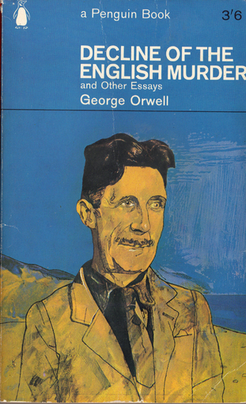
"Decline of the English Murder" is an essay by English writer George Orwell, wherein he analysed the kinds of murders depicted in popular media and why people like to read them. Tribune published it on 15 February 1946, and Secker and Warburg republished it after his death in Shooting an Elephant and Other Essays in 1952.

No Orchids for Miss Blandish is a 1948 British gangster film adapted and directed by St. John Legh Clowes from the 1939 novel of the same name by James Hadley Chase. It stars Jack La Rue, Hugh McDermott, and Linden Travers, with unbilled early appearances from Sid James, as a barman, and Walter Gotell, as a nightclub doorman. Due to the film's strong violence and sexual content for its time, amongst other reasons, several critics have called it one of the worst films ever made.
"My Country Right or Left" is an essay published in 1940 by the English author George Orwell. In it Orwell seeks to reconcile his intense feeling of patriotism and his left-wing views.

Nineteen Eighty-Four is a dystopian novel and cautionary tale by English writer George Orwell. It was published on 8 June 1949 by Secker & Warburg as Orwell's ninth and final book completed in his lifetime. Thematically, it centres on the consequences of totalitarianism, mass surveillance, and repressive regimentation of people and behaviours within society. Orwell, a staunch believer in democratic socialism and member of the anti-Stalinist Left, modelled the Britain under authoritarian socialism in the novel on the Soviet Union in the era of Stalinism and on the very similar practices of both censorship and propaganda in Nazi Germany. More broadly, the novel examines the role of truth and facts within societies and the ways in which they can be manipulated.
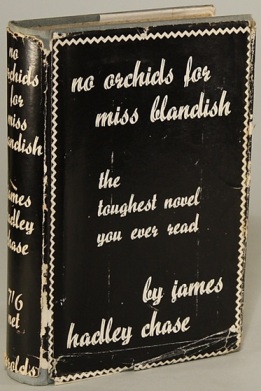
No Orchids for Miss Blandish is a 1939 crime novel by the British writer James Hadley Chase. It was a critical and commercial success upon release, though it also provoked considerable controversy due to its explicit depiction of sexuality and violence. In 1942, the novel was adapted into a stage play and in 1948 it became a British film. The novel became particularly popular with British servicemen during World War II.

"Good Bad Books" is an essay by George Orwell first published in Tribune on 2 November 1945. After Orwell's death, the essay was republished in Shooting an Elephant and Other Essays (1950).
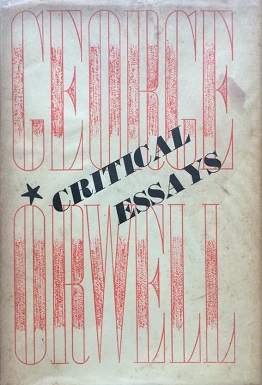
Critical Essays (1946) is a collection of wartime pieces by George Orwell. It covers a variety of topics in English literature, and also includes some pioneering studies of popular culture. It was acclaimed by critics, and Orwell himself thought it one of his most important books.

Arthur J. Raffles is a fictional character created in 1898 by E. W. Hornung, brother-in-law of Sir Arthur Conan Doyle, the creator of Sherlock Holmes. Raffles is, in many ways, an inversion of Holmes – he is a "gentleman thief", living at the Albany, a prestigious address in London, playing cricket as a gentleman for the Gentlemen of England and supporting himself by carrying out ingenious burglaries. He is called the "Amateur Cracksman" and often, at first, differentiates between him and the "professors" – professional criminals from the lower classes.
No Orchids for Miss Blandish is a 1942 British stage adaptation by James Hadley Chase and Robert Nesbitt of Chase's 1939 novel of the same name. It ran for 203 performances at the Prince of Wales Theatre in the West End.
J. R. R. Tolkien, the author of the bestselling fantasy The Lord of the Rings, was largely rejected by the literary establishment during his lifetime, but has since been accepted into the literary canon, if not as a modernist then certainly as a modern writer responding to his times. He fought in the First World War, and saw the rural England that he loved built over and industrialised. His Middle-earth fantasy writings, consisting largely of a legendarium which was not published until after his death, embodied his realism about the century's traumatic events, and his Christian hope.















